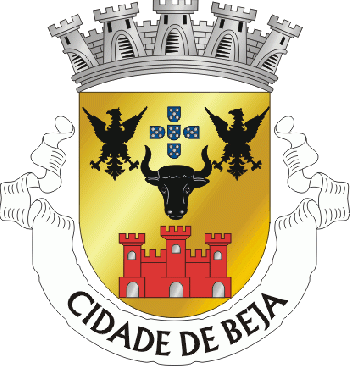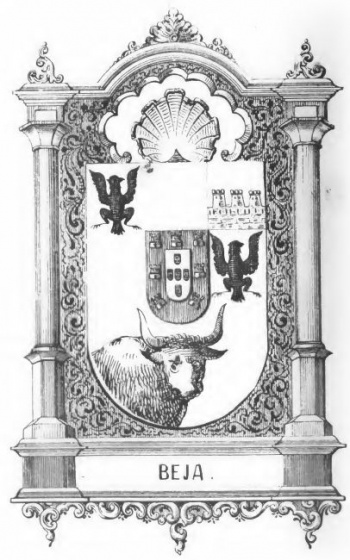Beja: Difference between revisions
Jump to navigation
Jump to search
Knorrepoes (talk | contribs) No edit summary |
Knorrepoes (talk | contribs) m (Text replacement - "|Arms of {{PAGENAME}}]]" to "|Coat of arms (crest) of {{PAGENAME}}]]") |
||
| Line 29: | Line 29: | ||
{|align="center" | {|align="center" | ||
|align="center"|[[File:{{PAGENAME}}1.jpg|center|350 px| | |align="center"|[[File:{{PAGENAME}}1.jpg|center|350 px|Coat of arms (crest) of {{PAGENAME}}]] <br/>The arms in 1860 | ||
|} | |} | ||
Revision as of 12:32, 20 August 2023
|
Country : Portugal District : Beja
|
| Portuguese | Escudo de ouro, com uma cabeça de touro de negro realçado de prata, visto de frente. Em chefe as quinas antigas de Portugal de azul carregadas por cinco besantes de prata em aspa. A quina e a cabeça do touro acompanhado por duas águias estendidas de negro. Em contra-chefe, um castelo de vermelho, aberto e iluminado de prata. Coroa mural de cinco torres de prata. Listel branco com a legenda " CIDADE DE BEJA " de negro. |
| English | blazon wanted |
Origin/meaning
The arms were officially granted on April 4, 1938.
The bull in the arms represents the abundance of cattle in this region.
The tower shows that Beja was a fortfied town, whereas the eagles are a symbol for the Roman origin of the city. The small blue shields are taken from the Royal arms of Portugal and indicate that the city has always been a Royal city.
| The arms in 1860 |
Freguesias in Beja :
- Albernoa
- Baleizão
- Beringel
- Cabeça Gorda
- Mombeja
- Nossa Senhora das Neves
- Quintos
- Salvada
- Salvador (Beja)
- Santa Clara de Louredo
- Santa Maria da Feira (Beja)
- Santa Vitória
- Santiago Maior (Beja)
- São Brissos
- São João Baptista (Beja)
- São Matias (Beja)
- Trindade (Beja)
- Trigaches
Contact and Support
Partners:
Your logo here ?
Contact us
© since 1995, Heraldry of the World, Ralf Hartemink 
Index of the site image provided by Sergio Horta











